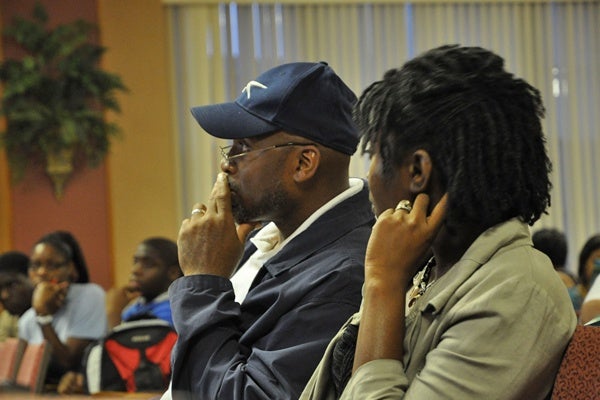How to afford sending your kids to college in tough financial times
As the fall college semester gets underway, the Logan Neighborhood Advisory Committee held a college-preparation workshop for parents and students who wanted tips on paying for higher education.
Thomas Butler is the executive director of Project GRAD, a college access program which aims to increase the percentage of Philadelphia school district students who graduate and attend college. At last week’s event, he said a more competitive workplace has made a college degree a hiring standard, as opposed to a high school diploma.
Butler delivered a crash course on finding college scholarships and offered other higher-education tips to a crowd of eager-to-learn parents at the Yorkhouse ballroom, located along Old York Road in Logan.
With the cost of higher education continues rising, he said affording it has become an increasingly difficult issue for low- to middle-income families.
“I would love for every black child to go to Harvard, but it ain’t gonna happen,” he said. “There’s just not the money for it.”
He also noted that, systematically, Philadelphia school district students are falling behind their peers at the college level because they weren’t adequately prepared to progress.
“Over 80 percent of students from Philly schools don’t place into freshman college courses,” he said, explaining that they’re placed in remedial classes to make up for concepts they never learned like algebra or calculus.
Financially speaking, he said filling out the Free Application for Federal Student Aid (FAFSA) form is a first step after which there are countless options to fill in the money gap.
He cited sites like collegeboard.com, fastweb.com, pheaa.org, scholarships.com and phillygoes2college.com for those seeking financial information and support, and suggested establishing a family email address just for scholarship hunting. That way, both students are parents are involved in the process.
“You have to figure out what makes you special from everyone else” when seeking scholarships, he said. A student’s “job is to be academically talented so that schools are going to want to spend money on you.”
High-school students with athletic talents should put academic pursuits first because, “You might be a Division I athlete but a Division II student.”
Some attendees noted that frank discussions about the reality of college life are missing from the current high school curriculum.
“Things have changed a lot since I came out of 12th grade and went to college,” said Dayna Robinson, of East Oak Lane, who has a daughter in 10th grade and a son in only 8th grade. “I have a lot of work to do.”
Some proactive parents have already carved out hours a week for scholarship hunting. Annette Thorton called her’s “Scholarship Sundays.”
“We wanted to dedicate Sunday afternoons to researching and applying to scholarships … so he has better chance,” she said of her son, Darion Queen, who will graduate from Delaware Valley Charter High School on Old York Road in the spring.
Thorton hopes to find enough scholarship money to help her son avoid taking out large student loans. A first-generation college graduate, Thorton said she didn’t know anything but loans was an option.
One scholarship that Queen has targeted is funded by the Bill and Melinda Gates Foundation and awarded to ethnic minorities with financial need. It offers financial support for undergraduate through doctoral degrees.
“You can’t be a procrastinator,” said Queen who, along with his mother, has been working on essay questions and scholarship applications.
WHYY is your source for fact-based, in-depth journalism and information. As a nonprofit organization, we rely on financial support from readers like you. Please give today.









